Kong
-
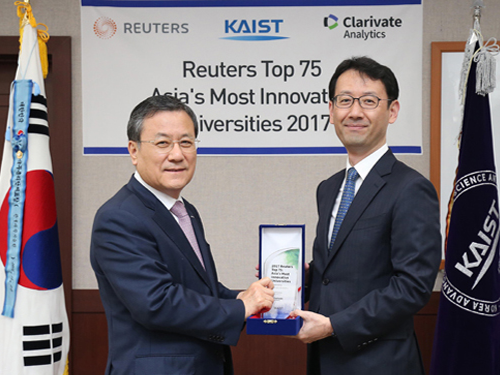 'KAIST the Most Innovative University in Asia-Pacific Region'
KAIST topped the most innovative universities ranking in the Asia and Pacific region for the second year in a row in 2017. Thomson Reuters released the second annual ranking of the Asia Pacific regions’ most innovative universities, a list that ranks the top 75 educational institutions doing the most to advance science and invent new technologies.
KAIST earned first place by producing a high volume of influential inventions. KAIST researchers submitted 923 patent filings from 2010 to 2015 and was the most cited in research papers, taking first place out of 75 top-ranked universities in the Asia and Pacific region. Those are key criteria in the rankings compiled in partnership with Clarivate Analytics. The Clarivate Analytics evaluates the institutions on 10 different metrics, focusing on academic paper citations and patent filings.
South Korean universities filled four out of the top five spots in the rankings and eight of the top 20 on the 2017 list. A total of 22 Korean universities were on the list of the top 75. Meanwhile 25 Chinese universities including Hong Kong, and 18 Japanese universities were listed in the rankings.
(Photo caption: Dr. Justin Kim (right), regional director of Clarivate Analytics Korea presents the plaque of the Most Innovative Univerisites in 2017 in Asia-Pacific region to President Sung-Chul Shin on June 15.)
2017.06.12 View 5040
'KAIST the Most Innovative University in Asia-Pacific Region'
KAIST topped the most innovative universities ranking in the Asia and Pacific region for the second year in a row in 2017. Thomson Reuters released the second annual ranking of the Asia Pacific regions’ most innovative universities, a list that ranks the top 75 educational institutions doing the most to advance science and invent new technologies.
KAIST earned first place by producing a high volume of influential inventions. KAIST researchers submitted 923 patent filings from 2010 to 2015 and was the most cited in research papers, taking first place out of 75 top-ranked universities in the Asia and Pacific region. Those are key criteria in the rankings compiled in partnership with Clarivate Analytics. The Clarivate Analytics evaluates the institutions on 10 different metrics, focusing on academic paper citations and patent filings.
South Korean universities filled four out of the top five spots in the rankings and eight of the top 20 on the 2017 list. A total of 22 Korean universities were on the list of the top 75. Meanwhile 25 Chinese universities including Hong Kong, and 18 Japanese universities were listed in the rankings.
(Photo caption: Dr. Justin Kim (right), regional director of Clarivate Analytics Korea presents the plaque of the Most Innovative Univerisites in 2017 in Asia-Pacific region to President Sung-Chul Shin on June 15.)
2017.06.12 View 5040 -
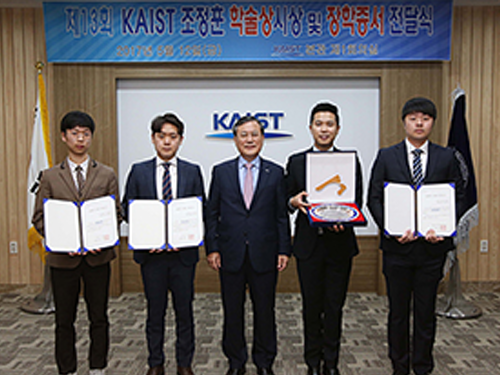 Dr. Zi Jing Wong Named 2017 Jeong Hun Cho Awardee
(Photo caption: The 2017 Jeong Hun Cho Scholarship recipients pose with President Shin (left photo) and Dr. Zi Jing Wong, the recipient of the 2017 Jeong Hun Cho Award)
Dr. Zi Jing Wong, a postdoctoral scholar at the University of California, Berkeley was named the 2017 recipient of the Jeong Hun Cho Award. The award recognizes outstanding young scientists in the field of aerospace engineering annually. The recipient receives a 20 million KRW prize.
The Award Committee said that Dr. Wong who earned his MS at KAIST Department of Aerospace Engineering is a rising scholar in the fields of optic meta materials, photonics, imaging, among others. He has published five papers on the realization of a zero refractive index and the control of a refractive index, as well as the realization of a 3D invisibility cloak in Science and Nature Photonics in 2014 and 2015. Dr. Wong also swept the best paper awards from many international academic societies including the US Materials Research Society, IEEE, SPIE, and Metamaterials Congress in 2015. He finished his Ph.D. at the University of California, Berkeley.
The Award Committee also named three recipients of the Jeong Hun Cho Scholarship: Ph.D. candidate Hyon-Tak Kim of the Department of Aerospace Engineering at KAIST, Ph.D. candidate Ho-Song Park from the Department of Mechanical Engineering at Korea University, and Hyong-Jin Choi of Kongju National University High School.
The award was endowed by the family of the late Ph.D. candidate Jeong Hun Cho who died in a rocket lab accident in the Department of Aerospace Engineering in 2003. Cho was posthumously conferred an honorary doctorate degree.
In memory of Cho, his father established the ‘Jeong Hun Cho Award and Scholarship.’ The scholarship annually selects three young scholars from Cho’s alma maters of KAIST, Korea University, and Kongju National University High School.
2017.05.12 View 12917
Dr. Zi Jing Wong Named 2017 Jeong Hun Cho Awardee
(Photo caption: The 2017 Jeong Hun Cho Scholarship recipients pose with President Shin (left photo) and Dr. Zi Jing Wong, the recipient of the 2017 Jeong Hun Cho Award)
Dr. Zi Jing Wong, a postdoctoral scholar at the University of California, Berkeley was named the 2017 recipient of the Jeong Hun Cho Award. The award recognizes outstanding young scientists in the field of aerospace engineering annually. The recipient receives a 20 million KRW prize.
The Award Committee said that Dr. Wong who earned his MS at KAIST Department of Aerospace Engineering is a rising scholar in the fields of optic meta materials, photonics, imaging, among others. He has published five papers on the realization of a zero refractive index and the control of a refractive index, as well as the realization of a 3D invisibility cloak in Science and Nature Photonics in 2014 and 2015. Dr. Wong also swept the best paper awards from many international academic societies including the US Materials Research Society, IEEE, SPIE, and Metamaterials Congress in 2015. He finished his Ph.D. at the University of California, Berkeley.
The Award Committee also named three recipients of the Jeong Hun Cho Scholarship: Ph.D. candidate Hyon-Tak Kim of the Department of Aerospace Engineering at KAIST, Ph.D. candidate Ho-Song Park from the Department of Mechanical Engineering at Korea University, and Hyong-Jin Choi of Kongju National University High School.
The award was endowed by the family of the late Ph.D. candidate Jeong Hun Cho who died in a rocket lab accident in the Department of Aerospace Engineering in 2003. Cho was posthumously conferred an honorary doctorate degree.
In memory of Cho, his father established the ‘Jeong Hun Cho Award and Scholarship.’ The scholarship annually selects three young scholars from Cho’s alma maters of KAIST, Korea University, and Kongju National University High School.
2017.05.12 View 12917 -
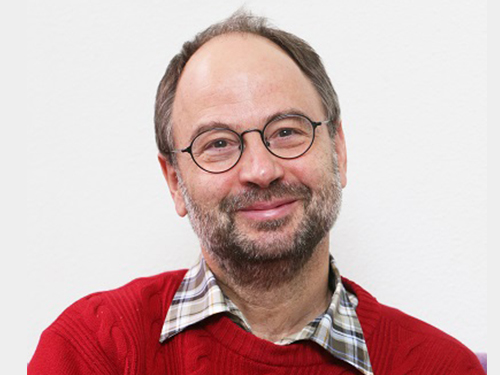 Professor Otfried Cheong Named as Distinguished Scientist by ACM
Professor Otfried Cheong (Schwarzkopf) of the School of Computing was named as a Distinguished Scientist of 2016 by the Association for Computing Machinery (ACM).
The ACM recognized 45 Distinguished Members in the category of Distinguished Scientist, Educator, and Engineer for their individual contributions to the field of computing. Professor Cheong is the sole recipient from a Korean institution. The recipients were selected among the top 10 percent of ACM members with at least 15 years of professional experience and five years of continuous professional membership.
He is known as one of the authors of the widely used computational geometry textbook Computational Geometry: Algorithms and Applications and as the developer of Ipe, a vector graphics editor. Professor Cheong joined KAIST in 2005, after earning his doctorate from the Free University of Berlin in 1992. He previously taught at Ultrecht University, Pohang University of Science and Technology, Hong Kong University of Science and Technology, and the Eindhoven University of Technology.
2017.04.17 View 9166
Professor Otfried Cheong Named as Distinguished Scientist by ACM
Professor Otfried Cheong (Schwarzkopf) of the School of Computing was named as a Distinguished Scientist of 2016 by the Association for Computing Machinery (ACM).
The ACM recognized 45 Distinguished Members in the category of Distinguished Scientist, Educator, and Engineer for their individual contributions to the field of computing. Professor Cheong is the sole recipient from a Korean institution. The recipients were selected among the top 10 percent of ACM members with at least 15 years of professional experience and five years of continuous professional membership.
He is known as one of the authors of the widely used computational geometry textbook Computational Geometry: Algorithms and Applications and as the developer of Ipe, a vector graphics editor. Professor Cheong joined KAIST in 2005, after earning his doctorate from the Free University of Berlin in 1992. He previously taught at Ultrecht University, Pohang University of Science and Technology, Hong Kong University of Science and Technology, and the Eindhoven University of Technology.
2017.04.17 View 9166 -
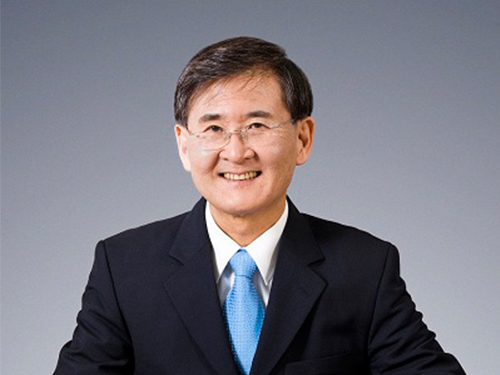 ISCN and GULF Share Best Practices Report
The International Sustainable Campus Network (ISCN) and the Global University Leaders Forum (GULF) co-hosted a conference at the 2016 World Economic Forum held on January 20-23, 2016 in Davos, Switzerland, to present exemplary campus sustainability case studies provided by the world’s leading universities.
A total of 20 universities, including KAIST, Harvard University, University of Oxford, Yale University, the National University of Singapore, the Hong Kong University of Science and Technology, and the Swiss Federal Institute of Technology (Zurich), reported on their endeavors to demonstrate sustainable development in higher education in three different panels at the conference: Developing Skills and Building Capacities, Collaborating to Catalyze Change, and Innovating for Efficient Built Environments.
President Sung-Mo Kang of KAIST gave a presentation on the Saudi Aramco-KAIST CO2 Management Center as a sustainable development model for KAIST.
KAIST and Saudi Aramco, the world’s leading fossil-fuel provider, joined forces in 2013 to establish a joint research center on the reduction and management of carbon dioxide (CO2) emissions, a major driver of climate change.
The research center, located at the KAIST campus in Daejeon, South Korea, is currently sponsoring ten research projects involving more than 20 doctoral-level researchers and over 100 students.
The goal of the center is to develop materials for more energy-efficient CO2 capture, catalysts and processes for converting CO2 into valuable products, novel storage methods, and system-level analyses of major CO2 emitting industries to suggest industry-specific CO2 reduction strategies including energy efficiency improvement.
The center’s work also includes analyzing the impact of potential government or industry-wide policies in the face of uncertainties, some of which are technological and economic as well as political. Besides its research activities, the center has also sponsored seminars and workshops throughout the year to raise awareness of the importance of CO2 management in building a sustainable future.
President Kang said that, from the beginning, the center has prompted researchers and students with different academic backgrounds and skill sets to work together to find integrative and systematic solutions to address real problems of critical importance to the world’s sustainability.
ISCN is a global non-profit association of leading colleges and universities representing over 20 countries, working together to holistically integrate sustainability into campus operations, research, and teaching. As of now, more 75 universities worldwide are the members of ISCN.
The GULF is composed of the presidents of the top 25 universities in the world. The World Economic Forum created it in 2006 to offer a non-competitive platform for high-level dialogue in academia. KAIST is the only Korean GULF member.
For the full report of the 2016 ISCN and GULF conference, go to http://www.international-sustainable-campus-network.org/downloads/general/441-2016-iscn-gulf-best-practice-report/file.
2016.01.25 View 11074
ISCN and GULF Share Best Practices Report
The International Sustainable Campus Network (ISCN) and the Global University Leaders Forum (GULF) co-hosted a conference at the 2016 World Economic Forum held on January 20-23, 2016 in Davos, Switzerland, to present exemplary campus sustainability case studies provided by the world’s leading universities.
A total of 20 universities, including KAIST, Harvard University, University of Oxford, Yale University, the National University of Singapore, the Hong Kong University of Science and Technology, and the Swiss Federal Institute of Technology (Zurich), reported on their endeavors to demonstrate sustainable development in higher education in three different panels at the conference: Developing Skills and Building Capacities, Collaborating to Catalyze Change, and Innovating for Efficient Built Environments.
President Sung-Mo Kang of KAIST gave a presentation on the Saudi Aramco-KAIST CO2 Management Center as a sustainable development model for KAIST.
KAIST and Saudi Aramco, the world’s leading fossil-fuel provider, joined forces in 2013 to establish a joint research center on the reduction and management of carbon dioxide (CO2) emissions, a major driver of climate change.
The research center, located at the KAIST campus in Daejeon, South Korea, is currently sponsoring ten research projects involving more than 20 doctoral-level researchers and over 100 students.
The goal of the center is to develop materials for more energy-efficient CO2 capture, catalysts and processes for converting CO2 into valuable products, novel storage methods, and system-level analyses of major CO2 emitting industries to suggest industry-specific CO2 reduction strategies including energy efficiency improvement.
The center’s work also includes analyzing the impact of potential government or industry-wide policies in the face of uncertainties, some of which are technological and economic as well as political. Besides its research activities, the center has also sponsored seminars and workshops throughout the year to raise awareness of the importance of CO2 management in building a sustainable future.
President Kang said that, from the beginning, the center has prompted researchers and students with different academic backgrounds and skill sets to work together to find integrative and systematic solutions to address real problems of critical importance to the world’s sustainability.
ISCN is a global non-profit association of leading colleges and universities representing over 20 countries, working together to holistically integrate sustainability into campus operations, research, and teaching. As of now, more 75 universities worldwide are the members of ISCN.
The GULF is composed of the presidents of the top 25 universities in the world. The World Economic Forum created it in 2006 to offer a non-competitive platform for high-level dialogue in academia. KAIST is the only Korean GULF member.
For the full report of the 2016 ISCN and GULF conference, go to http://www.international-sustainable-campus-network.org/downloads/general/441-2016-iscn-gulf-best-practice-report/file.
2016.01.25 View 11074 -
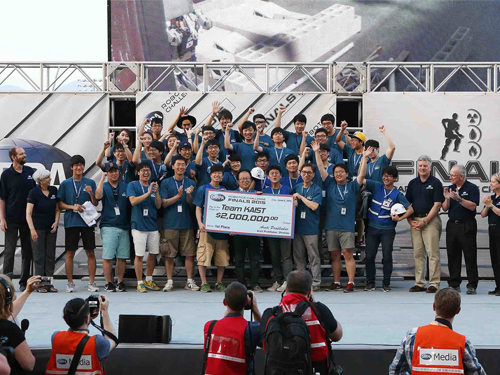 KAIST's DRC-HUBO Wins the DARPA Robotics Challenge 2015
DRC-HUBO finished all eight assignments in less than 45 minutes, taking first place among 24 international teams and claiming the USD 2 million prize offered by a US defense research agency.
The Robotics Challenge Finals 2015 hosted by the US Defense Advanced Research Projects Agency (DARPA) took place on June 5-6, 2015 at the Fairplex in Pomona, California.
Team KAIST of the Republic of Korea led by Professor Jun-Ho Oh of the Mechanical Engineering Department at the Korea Advanced Institute of Science and Technology (KAIST), Professor In-So Kweon of the Electrical Engineering Department, and researchers from Rainbow Co., the university’s spin-off company that builds the robots, won the DARPA Finals. The team received USD 2 million as a prize.
The DARPA’s Robotics Challenge (DRC) promotes a competition of robot systems and software teams which seek to develop robots capable of assisting humans in responding to natural and man-made disasters such as the Fukushima Daiichi nuclear incident in 2011. The DRC consists of three competitions: a software-based Virtual Robotics Challenge which took place in June 2013; the Robotics Challenge Trials in Homestead, Florida, in December 2013; and the Finals in June 2015.
A total of 24 teams from universities and private and public research institutes from Korea, the US, Hong Kong, Germany, Japan, and Italy participated in the Finals. The participating teams had to finish eight assignments in 60 minutes, during which their robots were untethered and operated wirelessly without communication from their engineers.
Each team was assigned a series of tasks: they included driving a vehicle, getting out of a vehicle, opening a door, turning a valve, drilling a hole in a wall, a surprise task such as pushing a button or turning on a switch, walking over rubble or debris, and climbing stairs. Robots scored a point each time they completed their missions. To win, a team had to complete all the tasks successfully in the shortest amount of time possible.
Team KAIST completed the entire course in 44 minutes and 28 seconds, followed by the Institute of Human and Machine Cognition (IHMC) Robotics in Pensacola, Florida in 50:26, and Team TARTAN Rescue of the National Robotics Engineering Center at Carnegie Mellon University in 55:15.
For details, see an article below from the New York Times:
New York Times, June 6, 2015
“Korean Robot Makers Walk Off With $2 Million Prize”
http://www.nytimes.com/2015/06/07/science/korean-robot-makers-walk-off-with-2-million-prize.html?_r=1
DRC-HUBO sticks a plug into an outlet for the surprise task at the 2015 DARPA Robotics Challenge on June 5-6, 2015, in Pomona, California.
DRC-HUBO turns a valve in a clockwise direction.
DRC-HUBO drills to cut a circle into the wall.
Members of Team KAIST pose together after the award ceremony on June 6, 2015.
2015.06.07 View 25552
KAIST's DRC-HUBO Wins the DARPA Robotics Challenge 2015
DRC-HUBO finished all eight assignments in less than 45 minutes, taking first place among 24 international teams and claiming the USD 2 million prize offered by a US defense research agency.
The Robotics Challenge Finals 2015 hosted by the US Defense Advanced Research Projects Agency (DARPA) took place on June 5-6, 2015 at the Fairplex in Pomona, California.
Team KAIST of the Republic of Korea led by Professor Jun-Ho Oh of the Mechanical Engineering Department at the Korea Advanced Institute of Science and Technology (KAIST), Professor In-So Kweon of the Electrical Engineering Department, and researchers from Rainbow Co., the university’s spin-off company that builds the robots, won the DARPA Finals. The team received USD 2 million as a prize.
The DARPA’s Robotics Challenge (DRC) promotes a competition of robot systems and software teams which seek to develop robots capable of assisting humans in responding to natural and man-made disasters such as the Fukushima Daiichi nuclear incident in 2011. The DRC consists of three competitions: a software-based Virtual Robotics Challenge which took place in June 2013; the Robotics Challenge Trials in Homestead, Florida, in December 2013; and the Finals in June 2015.
A total of 24 teams from universities and private and public research institutes from Korea, the US, Hong Kong, Germany, Japan, and Italy participated in the Finals. The participating teams had to finish eight assignments in 60 minutes, during which their robots were untethered and operated wirelessly without communication from their engineers.
Each team was assigned a series of tasks: they included driving a vehicle, getting out of a vehicle, opening a door, turning a valve, drilling a hole in a wall, a surprise task such as pushing a button or turning on a switch, walking over rubble or debris, and climbing stairs. Robots scored a point each time they completed their missions. To win, a team had to complete all the tasks successfully in the shortest amount of time possible.
Team KAIST completed the entire course in 44 minutes and 28 seconds, followed by the Institute of Human and Machine Cognition (IHMC) Robotics in Pensacola, Florida in 50:26, and Team TARTAN Rescue of the National Robotics Engineering Center at Carnegie Mellon University in 55:15.
For details, see an article below from the New York Times:
New York Times, June 6, 2015
“Korean Robot Makers Walk Off With $2 Million Prize”
http://www.nytimes.com/2015/06/07/science/korean-robot-makers-walk-off-with-2-million-prize.html?_r=1
DRC-HUBO sticks a plug into an outlet for the surprise task at the 2015 DARPA Robotics Challenge on June 5-6, 2015, in Pomona, California.
DRC-HUBO turns a valve in a clockwise direction.
DRC-HUBO drills to cut a circle into the wall.
Members of Team KAIST pose together after the award ceremony on June 6, 2015.
2015.06.07 View 25552 -
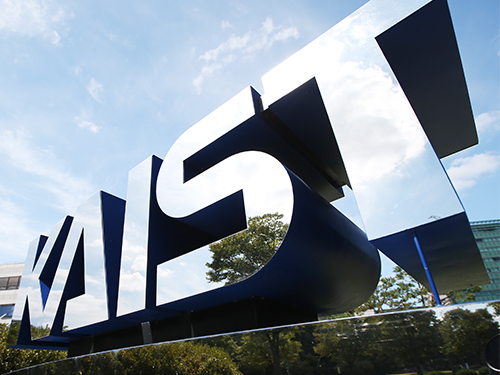 World Renowned Wireless Technology Experts Gathered in KAIST
KAIST hosted the 2015 IEEE WoW from June 5 to 6, 2015
Wireless power transfer technologies, such as wireless electric vehicles, trains and batteries, are increasingly in use. A conference, The 2015 IEEE WoW (Workshop on Wireless Power), was held in KI Building for two days starting June 5, 2015 to exchange ideas on the new trends and issues of the world wireless power technology.
The wireless power conference hosted by Institute of Electrical and Electronics Engineers (IEEE), IEEE WoW, was sponsored by its societies, PELS, IAS, IES, VTS, MAG, and PES.
This year’s conference took place in Korea for the first time and was titled “IEEE PELS Workshop on Emerging Technologies: Wireless Power.” The event was attended by around 200 experts in wireless power from 15 countries to discuss the international standards and current trends.
Keynote speakers were President Don Tan of IEEE; Professor Grant Covic of the University of Auckland; Andrew Daga, the CEO at Momentum Dynamics Corporation; Professor Ron Hui of the City University of Hong Kong; and Jung Goo Cho, the CEO of Green Power Technologies.
The forum included plenary speaking sessions on “The Futures of EV and Power Electronics,” “Development of IPT at the University of Auckland,” “Interoperable Solution for Wireless EV Charging,” “Development of IPT for Factory Automation,” “Commercialization of High Power WPT,” and “WPT: From Directional Power to Omni-directional Power.”
Notably, KAIST Professor Dong-Ho Cho, responsible for KAIST’s On-Line Electric Vehicle (OLEV) development, spoke on “The Development of Shaped Magnetic Field Systems for EVs and Trains” to introduce the KAIST OLEV bus and OLEV trains developed in cooperation with Korea Railroad Research Institute.
The Dialog Sessions on “The Futures of Wireless Electric Vehicles” were led by John M. Miller of JNJ Miller and “Road Charged EV and WPT Regulation and Standard for EV in Japan” by Yoichi Hori of University of Tokyo.
The General Chair of this year’s IEEE WoW, KAIST Professor Chun T. Rim said, “This forum serves a great assistance to the industry using wireless power technology in areas such as smartphones, home appliances, Internet of Things, and wearable devices.”
2015.05.29 View 10698
World Renowned Wireless Technology Experts Gathered in KAIST
KAIST hosted the 2015 IEEE WoW from June 5 to 6, 2015
Wireless power transfer technologies, such as wireless electric vehicles, trains and batteries, are increasingly in use. A conference, The 2015 IEEE WoW (Workshop on Wireless Power), was held in KI Building for two days starting June 5, 2015 to exchange ideas on the new trends and issues of the world wireless power technology.
The wireless power conference hosted by Institute of Electrical and Electronics Engineers (IEEE), IEEE WoW, was sponsored by its societies, PELS, IAS, IES, VTS, MAG, and PES.
This year’s conference took place in Korea for the first time and was titled “IEEE PELS Workshop on Emerging Technologies: Wireless Power.” The event was attended by around 200 experts in wireless power from 15 countries to discuss the international standards and current trends.
Keynote speakers were President Don Tan of IEEE; Professor Grant Covic of the University of Auckland; Andrew Daga, the CEO at Momentum Dynamics Corporation; Professor Ron Hui of the City University of Hong Kong; and Jung Goo Cho, the CEO of Green Power Technologies.
The forum included plenary speaking sessions on “The Futures of EV and Power Electronics,” “Development of IPT at the University of Auckland,” “Interoperable Solution for Wireless EV Charging,” “Development of IPT for Factory Automation,” “Commercialization of High Power WPT,” and “WPT: From Directional Power to Omni-directional Power.”
Notably, KAIST Professor Dong-Ho Cho, responsible for KAIST’s On-Line Electric Vehicle (OLEV) development, spoke on “The Development of Shaped Magnetic Field Systems for EVs and Trains” to introduce the KAIST OLEV bus and OLEV trains developed in cooperation with Korea Railroad Research Institute.
The Dialog Sessions on “The Futures of Wireless Electric Vehicles” were led by John M. Miller of JNJ Miller and “Road Charged EV and WPT Regulation and Standard for EV in Japan” by Yoichi Hori of University of Tokyo.
The General Chair of this year’s IEEE WoW, KAIST Professor Chun T. Rim said, “This forum serves a great assistance to the industry using wireless power technology in areas such as smartphones, home appliances, Internet of Things, and wearable devices.”
2015.05.29 View 10698 -
 KAIST Holds a Ceremony to Present the Cho Jeong-Hoon Academic Award
Doctor Gyu-Tae Kim from General Electric (GE) received the eleventh Cho Jeong-Hoon Academic Award. The award ceremony took place in the main conference room of the administration building on campus on May 13, 2015.
Dr. Kim, a graduate of KAIST, conducts research in the field of instable swirl combustion of gas turbines and has contributed to the development of aircraft engines. He earned his name as a researcher by identifying, for the first time in the world, the correlation between the thermoacoustic instability of gas turbine engines and the complex response of swirl flames.
Along with Dr. Kim, Shin-Jae Kang of the Aerospace Engineering Department, KAIST, Yong-Gyun Bae of the Mechanical Engineering Department, Korea University, and Ji-Won Kim from Kongju National University High School, received the Cho Jeong-Hoon scholarship.
The award was created in commemoration of Cho Jeong-Hoon who was killed in an explosion during his research at the KAIST Rocket Laboratory on May 13, 2003. Cho’s parents donated USD 450,000 to KAIST in his memory. Since 2005, a total of four students from KAIST, Korea University, and Kongju National University High School, all of which the late Honorary Doctor Cho attended, have received the scholarship.
2015.05.19 View 9032
KAIST Holds a Ceremony to Present the Cho Jeong-Hoon Academic Award
Doctor Gyu-Tae Kim from General Electric (GE) received the eleventh Cho Jeong-Hoon Academic Award. The award ceremony took place in the main conference room of the administration building on campus on May 13, 2015.
Dr. Kim, a graduate of KAIST, conducts research in the field of instable swirl combustion of gas turbines and has contributed to the development of aircraft engines. He earned his name as a researcher by identifying, for the first time in the world, the correlation between the thermoacoustic instability of gas turbine engines and the complex response of swirl flames.
Along with Dr. Kim, Shin-Jae Kang of the Aerospace Engineering Department, KAIST, Yong-Gyun Bae of the Mechanical Engineering Department, Korea University, and Ji-Won Kim from Kongju National University High School, received the Cho Jeong-Hoon scholarship.
The award was created in commemoration of Cho Jeong-Hoon who was killed in an explosion during his research at the KAIST Rocket Laboratory on May 13, 2003. Cho’s parents donated USD 450,000 to KAIST in his memory. Since 2005, a total of four students from KAIST, Korea University, and Kongju National University High School, all of which the late Honorary Doctor Cho attended, have received the scholarship.
2015.05.19 View 9032 -
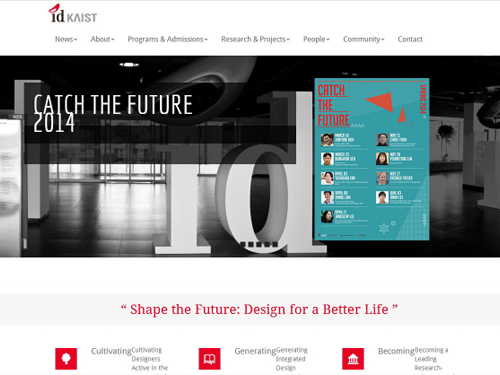 The Website of the KAIST Industrial Design Department Receives a Design Award
The 10th QS-Apple Higher Education Conference and Exhibition took place on November 11-13, 2014 in Taipei, Taiwan. The conference was hosted by Quacquarelli Symonds, a British company specializing in education, which publishes annually its world university rankings. Apple stands for Asia Pacific Professional Leaders in Education.
The QS-Apple conference supports the internationalization of Asia Pacific universities by providing opportunities for networking, exchanging best practices, and discussing recent developments in higher education. During the conference, the organizers presented the Creative Awards for best international education promotional designs in four categories: Website Pages, Video, Print Advertisement, and International Student Recruitment Brochures.
KAIST’s Industrial Design Department received the Best Website Pages Award for their website in recognition of high levels of user convenience and satisfaction as well as English language services. A total of 39 universities in the Asia and Pacific region competed in this category, and Nanyang Technological University in Singapore came in second place, followed by Hong Kong Baptist University in third.
2014.11.13 View 9972
The Website of the KAIST Industrial Design Department Receives a Design Award
The 10th QS-Apple Higher Education Conference and Exhibition took place on November 11-13, 2014 in Taipei, Taiwan. The conference was hosted by Quacquarelli Symonds, a British company specializing in education, which publishes annually its world university rankings. Apple stands for Asia Pacific Professional Leaders in Education.
The QS-Apple conference supports the internationalization of Asia Pacific universities by providing opportunities for networking, exchanging best practices, and discussing recent developments in higher education. During the conference, the organizers presented the Creative Awards for best international education promotional designs in four categories: Website Pages, Video, Print Advertisement, and International Student Recruitment Brochures.
KAIST’s Industrial Design Department received the Best Website Pages Award for their website in recognition of high levels of user convenience and satisfaction as well as English language services. A total of 39 universities in the Asia and Pacific region competed in this category, and Nanyang Technological University in Singapore came in second place, followed by Hong Kong Baptist University in third.
2014.11.13 View 9972 -
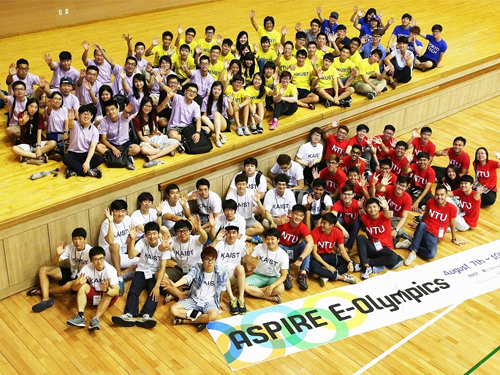 ASPIRE League 2014: E-Olympics among Five Asian Universities
About 150 undergraduate students from five leading science and technology (S&T) universities in Asia met at the KAIST campus to attend the E-Olympics on August 7-9, 2014.
The E-Olympics began as a student exchange conference held under the Asian Science and Technology Pioneering Institutes of Research and Education (ASPIRE) League, which offers a variety of events, such as workshops, sports matches, lab visits, special lectures, and art performances, to promote academic and research collaborations and cultural sharing between the students of the league member universities.
Founded in 2009, the ASPIRE League is a university consortium consisted of five top S&T universities in Asia: KAIST in Korea, the Hong Kong University of Science and Technology (HKUST) and Tsinghua University in China, Nanyang Technological University (NTU) in Singapore, and Tokyo Institute of Technology (Tokyo Tech) in Japan. The ASPIRE League aims to provide a knowledge and technology hub for innovation in Asia through the advancement of science and technology and the development of human resources.
Since its start, the ASPIRE League has been holding an annual conference with programs for research collaboration, student exchange, educational cooperation, and satellite laboratories among professors, senior managers, and students of the member universities. This year, however, the consortium decided to dedicate the conference to students by holding the E-Olympics.
Each university sent 30 students to KAIST for the participation of the E-Olympics. For three days, participating students engaged in discussions and presentations at academic workshops; held athletic games including a relay race, basketball, and a rowing race; and toured a few KAIST laboratories, among them: the E-mobility Research Center, the Bio-imaging and Cell Signaling Research Center, the Mechatronics Systems and Control Center, and the Center of Field Robotics for Innovation, Exploration and Defense.
The students also attended a music concert performed by a KAIST student club and a lecture entitled “Entrepreneurship through Global Networking” that emphasized the importance of personnel networking in transferring technological innovation into business opportunities.
Chang-Dong Yoo, the Dean of the International Office at KAIST, said, “The E-Olympics will offer students from top science and technology universities in Asia opportunities to interact with each other on a more personal level. I hope that through many of the E-Olympics programs, the students will learn about each other’s culture and academic strength and develop a sense of community to create a “New Asia” by working together.”
2014.08.11 View 14334
ASPIRE League 2014: E-Olympics among Five Asian Universities
About 150 undergraduate students from five leading science and technology (S&T) universities in Asia met at the KAIST campus to attend the E-Olympics on August 7-9, 2014.
The E-Olympics began as a student exchange conference held under the Asian Science and Technology Pioneering Institutes of Research and Education (ASPIRE) League, which offers a variety of events, such as workshops, sports matches, lab visits, special lectures, and art performances, to promote academic and research collaborations and cultural sharing between the students of the league member universities.
Founded in 2009, the ASPIRE League is a university consortium consisted of five top S&T universities in Asia: KAIST in Korea, the Hong Kong University of Science and Technology (HKUST) and Tsinghua University in China, Nanyang Technological University (NTU) in Singapore, and Tokyo Institute of Technology (Tokyo Tech) in Japan. The ASPIRE League aims to provide a knowledge and technology hub for innovation in Asia through the advancement of science and technology and the development of human resources.
Since its start, the ASPIRE League has been holding an annual conference with programs for research collaboration, student exchange, educational cooperation, and satellite laboratories among professors, senior managers, and students of the member universities. This year, however, the consortium decided to dedicate the conference to students by holding the E-Olympics.
Each university sent 30 students to KAIST for the participation of the E-Olympics. For three days, participating students engaged in discussions and presentations at academic workshops; held athletic games including a relay race, basketball, and a rowing race; and toured a few KAIST laboratories, among them: the E-mobility Research Center, the Bio-imaging and Cell Signaling Research Center, the Mechatronics Systems and Control Center, and the Center of Field Robotics for Innovation, Exploration and Defense.
The students also attended a music concert performed by a KAIST student club and a lecture entitled “Entrepreneurship through Global Networking” that emphasized the importance of personnel networking in transferring technological innovation into business opportunities.
Chang-Dong Yoo, the Dean of the International Office at KAIST, said, “The E-Olympics will offer students from top science and technology universities in Asia opportunities to interact with each other on a more personal level. I hope that through many of the E-Olympics programs, the students will learn about each other’s culture and academic strength and develop a sense of community to create a “New Asia” by working together.”
2014.08.11 View 14334 -
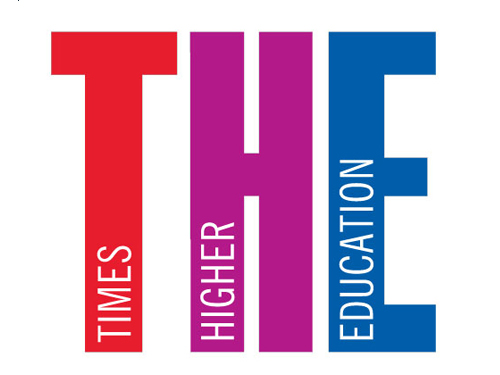 Times Higher Education magazine features KAIST, July 2014
The Times Higher Education (THE) has featured KAIST in an article entitled “Young Universities’ Secrets of Success” dated on July 17, 2014.
The magazine chose five universities from the Times Higher Education's 100 Under 50 2014 rankings: KAIST, Koç University in Turkey, Maastricht University in Netherlands, Nanyang Technological University in Singapore, and Hong Kong Polytechnic University, China. These universities are less than 50 years old.
The article highlighted some of their current efforts to deliver quality administrative service for students and professors as well as innovative education and research programs to set them apart from long-established elite universities such as Harvard and Cambridge.
For the full text, please visit the link below:
Times Higher Education, July 17, 2014
“Young Universities’ Secret of Success”
http://www.kaist.ac.kr/Upl/downfile/THE's_Article_Jul_17_2014.pdf
2014.07.23 View 7398
Times Higher Education magazine features KAIST, July 2014
The Times Higher Education (THE) has featured KAIST in an article entitled “Young Universities’ Secrets of Success” dated on July 17, 2014.
The magazine chose five universities from the Times Higher Education's 100 Under 50 2014 rankings: KAIST, Koç University in Turkey, Maastricht University in Netherlands, Nanyang Technological University in Singapore, and Hong Kong Polytechnic University, China. These universities are less than 50 years old.
The article highlighted some of their current efforts to deliver quality administrative service for students and professors as well as innovative education and research programs to set them apart from long-established elite universities such as Harvard and Cambridge.
For the full text, please visit the link below:
Times Higher Education, July 17, 2014
“Young Universities’ Secret of Success”
http://www.kaist.ac.kr/Upl/downfile/THE's_Article_Jul_17_2014.pdf
2014.07.23 View 7398 -
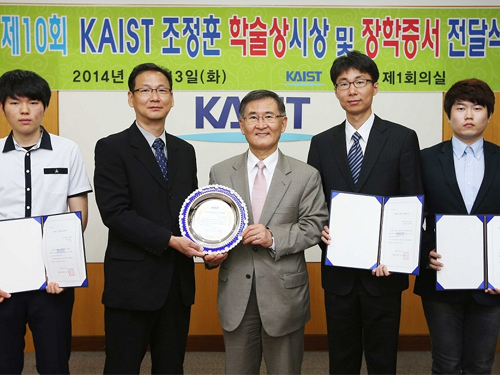 Dr. Sung-Gu Kim of KARI receives the 10th KAIST Jung-Hun Cho Academic Award
KAIST President Steve Kang awarded the 10th "KAIST Jung-Hun Cho Academic Award" to Dr. Sung-Gu Kim of Korea Aerospace Research Institute (KARI) along with Byeong-Sup Park, a graduate student of KAIST Aerospace Engineering, Hee-Won Chae of Korea University, and Jin-Hyung Noh of Kongju National University High School on May 13, 2014.
Dr. Sung-Gu Kim was recognized for his development of a 30-ton class reproduction cooling burner and the securing of essential factor technology for liquid-fuel rocket engines on the Naro project.
The KAIST Jung-Hun Cho Academic Award was established to commemorate Jung-Hun Cho who was killed while researching in the rocket laboratory on May 13, 2003. From 2005, young scientists from the Aerospace Engineering field have been recognized every year. One student each from KAIST, Korea University, and Kongju National University High School, where the honorary doctorate Dr. Cho attended, has been chosen as a scholarship recipient.
The KAIST Jung-Hun Cho Academic Award was established with USD 460,000 in funds donated from Cho's family.
2014.05.17 View 10955
Dr. Sung-Gu Kim of KARI receives the 10th KAIST Jung-Hun Cho Academic Award
KAIST President Steve Kang awarded the 10th "KAIST Jung-Hun Cho Academic Award" to Dr. Sung-Gu Kim of Korea Aerospace Research Institute (KARI) along with Byeong-Sup Park, a graduate student of KAIST Aerospace Engineering, Hee-Won Chae of Korea University, and Jin-Hyung Noh of Kongju National University High School on May 13, 2014.
Dr. Sung-Gu Kim was recognized for his development of a 30-ton class reproduction cooling burner and the securing of essential factor technology for liquid-fuel rocket engines on the Naro project.
The KAIST Jung-Hun Cho Academic Award was established to commemorate Jung-Hun Cho who was killed while researching in the rocket laboratory on May 13, 2003. From 2005, young scientists from the Aerospace Engineering field have been recognized every year. One student each from KAIST, Korea University, and Kongju National University High School, where the honorary doctorate Dr. Cho attended, has been chosen as a scholarship recipient.
The KAIST Jung-Hun Cho Academic Award was established with USD 460,000 in funds donated from Cho's family.
2014.05.17 View 10955 -
 Hosting of Third Annual 2012 Social Web International Workshop
KAIST Department of WebScience Engineering hosted the 2012 Social Web International Workshop in JaeJu Ramada Hotel.
The 3rd Annual International Workshop involves the coming together of domestic and international experts on various fields like sociology, journalism, electronics, economics, and etc. to introduce and discuss the direction of social web’s numerous factions.
Dr. Krishna Gummadi (Max Plank Research Institute), Professor Irwin King (Chinese University of Hong Kong), Dr. Winter Mason (Stevens Technology Research Institute), and Professor Daniele Quercia (Cambridge University) made up the international participants of the workshop.
Professor Kim Yong Chan (Yonsei University), Professor Kim Ye Ran (KwangWoon University), Professor Park Ju Yong (Kyung Hee University), Professor Oh Hae Yeon and Professor Lee Won Jae (KAIST) made up the domestic participants to the workshop.
The workshop was a place for free discussion of social networks and apps and the research direction of social sciences.
2012.08.21 View 8329
Hosting of Third Annual 2012 Social Web International Workshop
KAIST Department of WebScience Engineering hosted the 2012 Social Web International Workshop in JaeJu Ramada Hotel.
The 3rd Annual International Workshop involves the coming together of domestic and international experts on various fields like sociology, journalism, electronics, economics, and etc. to introduce and discuss the direction of social web’s numerous factions.
Dr. Krishna Gummadi (Max Plank Research Institute), Professor Irwin King (Chinese University of Hong Kong), Dr. Winter Mason (Stevens Technology Research Institute), and Professor Daniele Quercia (Cambridge University) made up the international participants of the workshop.
Professor Kim Yong Chan (Yonsei University), Professor Kim Ye Ran (KwangWoon University), Professor Park Ju Yong (Kyung Hee University), Professor Oh Hae Yeon and Professor Lee Won Jae (KAIST) made up the domestic participants to the workshop.
The workshop was a place for free discussion of social networks and apps and the research direction of social sciences.
2012.08.21 View 8329